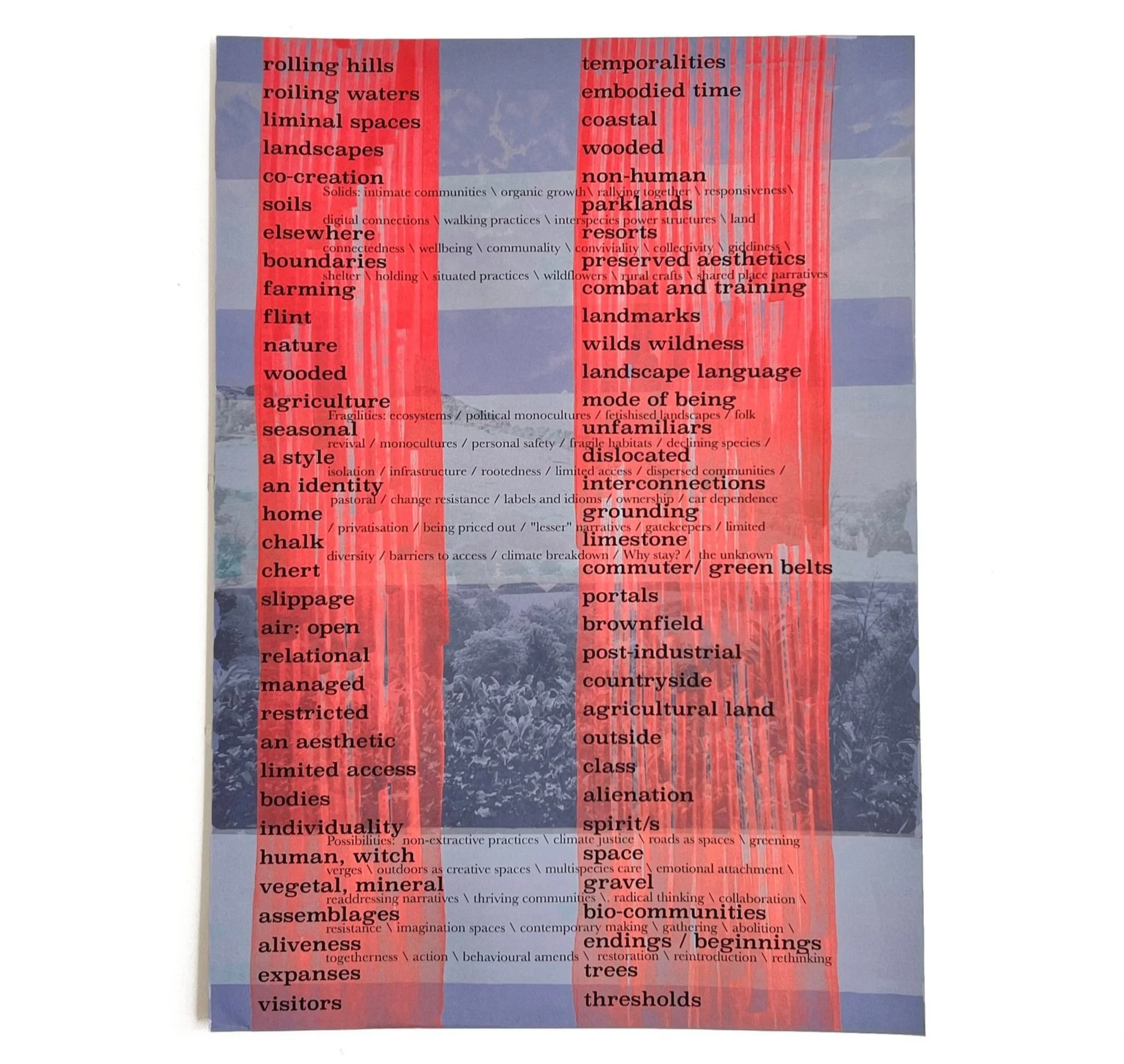Rural Facets




































A project exploring ruralities and artist practices in collaboration with VASW. Rural Facets was a trio of gatherings for artists to network, share practice and amplify our own narratives of the rural.
Taking place in the New Forest, online and at Lower Hewood Farm Rural Facets was created and convenned by artist Laura Eldret, commissioned by Visual Arts Southwest in partnership with More Than Ponies and co-hosted with PaC artists (James Aldridge, Gemma Gore, Alys Scott-Hawkins, Melanie Rose). The series of gatherings was for critically engaged artists who identify with the / as rural or any of it’s many facets. Intended to forge new connections, create a forum of support and celebrate contemporary rural relevancies, criticality and artistic practice- creating a community of sharing and caring. Alongside the gatherings a co-created and distribute edition was also planned as an act of advocacy for rural practice and provision, a raising of artist voices that often are isolated.
Rural creative contexts are so often defined as lacking. The government define rural areas as having less people, sparse and isolated. Perpetuated rural creative practices are often distancing e.g landscapes (places faraway, over there), folk forms (from long ago). And with mainstream negative narratives of the hyper modernisation of rural places with robot run farms and trampling trespassers, Rural Facets responds to Visual Arts Southwest’s prompt ‘How can I stay?’ by accounting for and addressing: Why those who stay stay? Why those who return return; and Why those who draw from it (the rural) do? Celebrating our creative rural realms and finding ways to thrive. Together we explored ideas that readdress narratives of the rural as lesser, lacking and defined in opposition to urban places. Positioning rural concerns and practices as critical for all society, together we shared, cared and accounted for contemporary narratives of rural contexts of contemporary making, radical thinking, roaming, resistance and collaboration.
- With special thanks to all participating and contributing artists (both named and unnamed), Michael Woods for his thought-provoking contributions, the access and generosity of Claire, Tim and Alexa at Lower Hewood Farm, and all those at VASW who made Rural Facets possible.
← Rural Facets, 2024. Artists edition by Laura Eldret. Words co-authored with Alexa de Ferranti, Alys Scott-Hawkins, Andy Parker, Emily Hawes, Eugenia Ivanissevich, Feral Practice, Fran Farrar, Gemma Gore, Hannah Rose, Hector MacInnes, James Aldridge, Jenny Staff, Jessica Potter, Jinny Jehu, Kasia Garapich, Laura Hopes, Liz Clifford, Lynne Williams, Melanie Rose, Rae Turpin, Rachel McRae, Sarah Filmer, Simone Einfalt, Simon Lee-Dicker, Tamsin Loveday, Tracy Dovey, Vanessa Rolf ©️2024.
The edition is freely available to all for £0 under a creative commons license BY-NC-SA and as a a limited print run of 200 + 50 ap’s on 170gsm recycled, carbon free paper for the cost of P+P from £3.
“ Knowledge commons and an edition…
As the project evolved, the first and second gatherings took place, the artists edition was planned, an online noticeboard for the group was populated with various ideas, and a web of conversations and communications was unfolding between participating and host artists. I introduced the idea of understanding the project as an ‘experimental knowledge commons’: collectively sharing, collating and distributing our knowledges of the rural with each other and beyond, and exploring how a ‘commons’ may be a way to convene diverse communities and knowledges.
Understanding Rural Facets as a knowledge commons (Hess and Ostrom, 2011) provided a way of accounting for multiple modes of knowledge (spoken thoughts, artworks, lived experiences, creative practices, reading, writing, etc.) being shared and understood to be of equal importance and relevance. It enabled participants to feel that they might share whatever they wanted and to take out of the project what they needed.
The Rural Facets edition maps and forms part of our experimental knowledge commons we created of creative rural artist practices. Words were harvested from our conversations, shared artworks and activities. These are presented as a weaving of descriptors, solids, fragilities and possibilities of our rural facets. “
- extract from VASW editorial on Rural Facets project by Laura Eldret read the full article here
What happened:
On Friday 21 June we met to walk/ roam/ traverse together in New Forest, Hampshire. Readings and activities on ruralities were shared by PaC artists and refreshments served.
On Saturday 29 June we gathered online in an event that included a series of short presentations with guest speakers and mapping exercises for all participants to share their rural narratives and practice.
On Saturday 7 September we gathered at Lower Hewood Farm in Chard, Dorset. All participanting artists were invited to shared their own artworks and research. The day included lunch and some farm-based activities.
Rural Facets was intended to allow for genuine time for participants who are invited to contribute thinking to think, share their practices and navigate this expansive area of discussion (ruralities). Rural focused reading/ watching/listening material was shared but not a demand to partake in.
Access:
We recognise that experiences of the rural are informed by individual needs and identities, and the intersectional nature of these.
To ensure genuine accessibility we believe in the need for diverse forms of delivery and this has informed the sites of gathering. We however recognise that everyone may not be able to attend all events. We asked that participants were at least able to attend one AFK (away from the keyboard) event and the online gathering.
No one pays or is paid for attending PaC events.
VASW funds awarded to MTP for Rural Facets is being used to pay for venues, refreshments, hosting artists’ admin and planning time, edition production costs, documentation, access requirements and other overheads.

